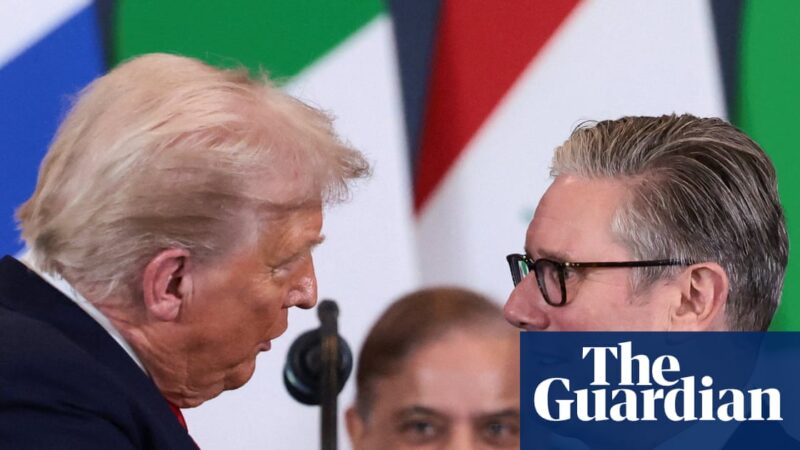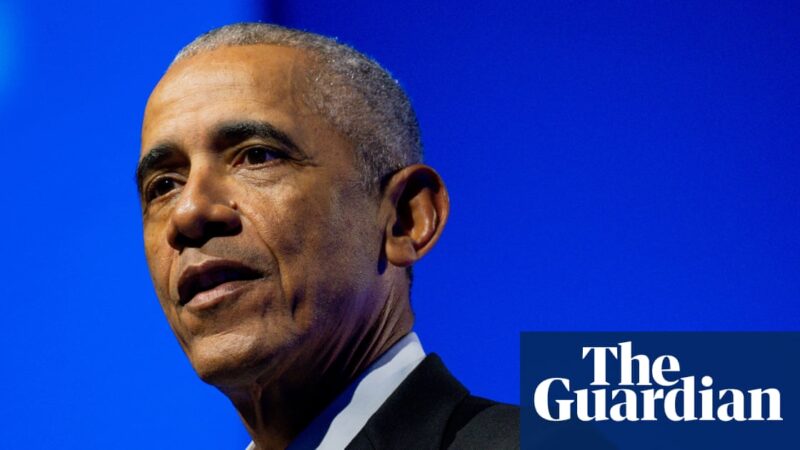‘Japanese first’: the mini-Trump on the rise as population crisis bites | Japan
Sleeves rolled up and perched atop his campaign vehicle, Sohei Kamiya was a familiar sight in Tokyo as he railed against the political establishment in the run-up to Japan’s upper house elections. He drew applause from admirers, and grimaces from those fearful of his divisive brand of “Japanese first” politics – inspired by his natural ally, Donald Trump.
Kamiya’s political party, Sanseito – literally the “political participation party” – has been described as far-right, ultraconservative and nationalist – with migrants, the “liberal elite” and foreign capital the objects of its anger. Its nickname – the do-it-yourself party – speaks to its role, it says, as a place for self-starters who have grown tired of the Japanese political mainstream.
While it was once dismissed as a fringe anti-immigration party – it entered the upper house elections holding just one seat – it is now unmistakably in the ascendancy, emerging from the July vote with 15 seats.
The 47-year-old Kamiya regards the far-right label as a “smear” by his critics in the media. “Rather than being anti-immigration, I think it would be better to have tougher restrictions on immigration,” he says in an interview with the Guardian at his parliamentary office. “As for being anti-foreigner, that’s a complete misunderstanding.” Sanseito’s proposals, he said, were designed to create a country that is “not dependent on immigrants and foreigners”.
Kamiya drew heavily on rightwing talking points during campaigning, repeatedly calling for tougher restrictions on immigrants, whose number has risen dramatically as Japan looks to foreign workers to fill large gaps in its workforce.
He has also angered gender equality campaigners with calls for younger women to focus on having children rather than going out to work; and he used a racist epithet aimed at Japan’s large ethnic Korean population, for which he later apologised.
Much of the aftermath of the elections focused on the parlous state of the ruling Liberal Democratic party (LDP) – a formidable force in conservative politics for seven decades – whose leader, Shigeru Ishiba, has since announced his resignation as prime minister. His political demise contrasts with the meteoric, and unconventional, rise of Sanseito and its leader.
Immigration driving support
Kamiya, a former supermarket manager and teacher, was first elected as a city assembly member in Suita, Osaka prefecture, with a mission, in his words, “to educate and change the mindset of young people”. He ran for the LDP in the 2012 lower house elections but left the party after failing to get elected.
Sanseito’s message has resonated with disaffected conservatives, but also to an eclectic group of conspiracy theorists and ideological outliers: those who believed that the Covid-19 pandemic had been artificially created and the vaccine used as a “weapon of control”, as well as opponents of the invidious role of powerful and secretive liberal elites. They found a political home in Kamiya’s party, whose YouTube channel has more than half a million subscribers.
In online interviews Kamiya has frequently referenced the “deep state” – a conspiracy theory originating in the US that society is controlled in secret by the privileged few in politics and business as well as the media.
The momentum behind Sanseito has prompted comparisons with Reform UK and Germany’s AfD, while Kamiya has been described as a mini-Trump, right down to his campaign slogan “Japanese first” – a call to address what he called a “silent invasion” of immigrants, as well as a wave of tourism that is pricing Japanese out of everything from restaurant meals to hotel rooms. The rhetoric struck a chord with enough younger voters to jolt the LDP and other established parties out of their complacency.
“We need politics that prioritise the lives of the people,” Kamiya says. “That’s why we campaigned to put Japanese people first.”
Many voters find Sanseito’s worldview deeply problematic. Kamiya recently drew accusations of sexism and ageism when he said the government had gone “too far” in encouraging younger women to work rather than have more children to address Japan’s stubbornly low birthrate.
Human rights groups protested after he used a derogatory term for Koreans in a campaign speech, while teachers voiced alarm after the party said school pupils should respect the “traditional values” enshrined in the long-abandoned 1890 Imperial Rescript on Education, which called for absolute loyalty to the emperor and personal sacrifice for the good of the nation.
Sanseito members have called for Japan to possess nuclear weapons and oppose same-sex marriage and other LGBTQ+ rights; in August its MPs visited Yasukuni, a controversial war shrine, on the 80th anniversary of Japan’s defeat in the second world war.
But it is immigration that is driving support for a party that was formed just over five years ago with a handful of full-time staff and fewer than 3,000 members – and which now claims to have 90,000 registered supporters and members.
Echoes of Reform UK
The party has succeeded in turning migration into a national issue, wrongfooting the LDP and other established parties. Japan’s foreign-born population had risen to almost 4 million by the start of this year, as the world’s fourth-biggest economy accepted migrant workers from other parts of Asia to fill holes in the labour market. The population of Japanese nationals, by contrast, fell to a record low of 120.6 million, according to the latest government data.
The rise in the migrant worker population is expected to continue, creating a political opportunity for Sanseito to exploit fears for Japanese society, however unfounded they may be.
At 3%, Japan’s foreign born population remains small compared to countries like the US, where it sits at 15% of the population.
“If (migration) exceeds 10% of the total population, it will become a major problem,” Kamiya says. “Looking at the situation in other countries, if we continue at the current rate, we’ll exceed 10% in about 10 years. That would be too sudden. I would be troubled if Japan became like America … if things continued like that, Japan would lose its originality and charm.”
“Putting Japanese people first isn’t about expelling foreigners – something I was accused of supporting. Instead, it is about anti-globalism” – a reference to a movement that grew out of opposition to the global financial status quo and the “hidden” influence of a powerful corporate elite. For some, though, it is also shorthand for antisemitism.
Sanseito drew allegations of antisemitism in 2022, when it published a pamphlet, edited by Kamiya, that claimed “Jewish financiers” were profiting from inciting fear about the coronavirus.
Kamiya strongly rejects charges that he is antisemitic, pointing to his membership of the Japan-Israel Friendship Society and two enjoyable trips to Israel. “I don’t have any prejudice against Jews or Israel.”
Kamiya claims the party has weeded out its more extreme elements. This month, however, it organised a seminar featuring the American rightwing activist Charlie Kirk, who was shot dead last week, as its keynote speaker. The party also drew criticism this week when it appointed Mayuko Toyota, a former LDP lower house member, to its policy research council. Toyota resigned from the party in 2017 after reports that she had assaulted and verbally abused her secretary. She denied the physical assault claims but admitted to the verbal abuse. Prosecutors charged her with assault but dropped the case when her victim intervened, saying he did not want her to be punished.
Kamiya denies, though, that Sanseito is determined to drag Japanese politics further to the right. “When it comes to anti-globalism, particularly in the US and Europe, we are almost always labelled as far right … but in fact, I don’t really support conservative parties in Japan, and there are both conservative and liberal people inside Sanseito.”
There are strong echoes of the political zeitgeist in Britain, where the high polling figures for Nigel Farage’s Reform UK is corralling the Labour government into taking increasingly harder lines on migration. This month, Japan’s government said it would strive to attain “zero illegal foreign nationals”, along with possible limits on new arrivals and measures to ensure “social integration”.
Kamiya concedes that his band of 18 MPs – including three in the lower house – will have limited influence on policy. Instead, he is playing a longer game in the expectation that Japan’s increasingly fractured political landscape will open the door to smaller parties to join right-leaning coalitions.
“Unless a political party has about 50 to 60 seats in both houses combined, it will not be able to take on the role of government,” he says. “My biggest goal right now is to create a party strong enough to do that.”
While Kamiya counts Reform UK, the AfD and Giorgia Meloni’s Brothers of Italy – all of which have created and then exploited anti-migrant rhetoric – as loose allies, he is reluctant to draw parallels between Europe and Japan.
“The difference between Japan and Europe is that the immigration situation is more severe there. Japan still has a long way to go. I don’t want us to have to take drastic measures, so if we put proper restrictions in now, we won’t have to resort to expelling people. We should take action sooner rather than later.”





